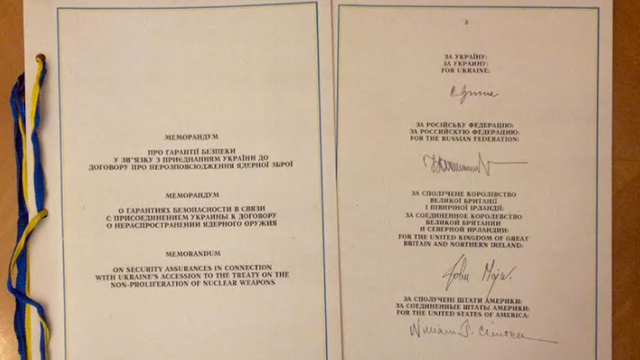
The topic of security guarantees for Ukraine under the Budapest Memorandum again surfaced in the information space thanks to the joint appeal of three former Ukrainian presidents – Leonid Kravchuk, Leonid Kuchma and Viktor Yushchenko.
Against the backdrop of a possible new wave of aggression from Russia, they turned to the signatory countries of the document and urged them to fulfill their obligations.
What is discussed in the Budapest Memorandum, which secured the non-nuclear status of Ukraine in exchange for ensuring security – further in the material.
Who and when signed the Budapest Memorandum
The signing of the Budapest Memorandum was preceded by Ukraine's accession to the Treaty on the Non-Proliferation of Nuclear Weapons . It happened on November 16, 1994 .
And on December 5, 1994, the memorandum itself was signed . This happened in Budapest (Hungary), hence the name of the document.
It was signed by the second President of Ukraine Leonid Kuchma, US President Bill Clinton, British Prime Minister John Major, and Russian President Boris Yeltsin.
The Budapest Memorandum declared the non-nuclear status of Ukraine. In exchange for this, the three nuclear states – the United States, Great Britain and Russia pledged to respect the independence and existing borders of Ukraine.
Subsequently , two more nuclear-weapon states, France and China, joined the memorandum.
What is the text of the Budapest Memorandum about?
The full title of the document is the Memorandum on Security Assurances in Connection with Ukraine's Accession to the Treaty on the Non-Proliferation of Nuclear Weapons.
It has only six items . Thus, Ukraine pledged to eliminate all nuclear weapons that at that time were on its territory (and this was the third largest nuclear arsenal in the world).
At the same time, the signatory countries of the memorandum:
1. Undertook to respect the independence, sovereignty and existing borders of our state.
2. Undertook to refrain from the threat or use of force against the territorial integrity and political independence of Ukraine. The memorandum notes that no weapons of the signatory countries will ever be used against Ukraine, except for self-defense purposes.
3. Undertook to refrain from economic pressure on our state, “aimed at subordinating to their own interests the exercise by Ukraine of the rights inherent in its sovereignty.”
4. Undertook to demand immediate action from the UN Security Council to provide assistance to Ukraine in the event of an act of aggression or threats of aggression using nuclear weapons.
5. Reaffirmed their commitment to Ukraine not to use nuclear weapons.
6. Decided to hold consultations when a situation arises that will relate to the obligations set out in the memorandum.
As a result, Ukraine abandoned its nuclear missile potential, the third largest in the world (after the US and Russia). These are, in particular, 220 units of strategic launch vehicles (intercontinental ballistic missiles and strategic bombers equipped with cruise missiles), as well as 2,500 units of tactical nuclear weapons.
And already in 2014, one of the signatories of the Budapest Memorandum – Russia – violated its obligations , seized the Ukrainian peninsula of Crimea and unleashed a war in the Donbass, which has been going on for eight years.
It should be noted that there is a difference between the language versions of the Budapest Memorandum .
So, if the Ukrainian and Russian versions of the document contain the phrase “security guarantees” in the title, then the English version refers to “security assurances” (“security assurances”, not “guarantees”).
It is the variant, in the name of which “assurances” is used, that the USA and Great Britain use. In this regard, Washington stated that Ukraine received “security assurances, not guarantees.”
Ukrainian Foreign Minister Dmytro Kuleba also acknowledged that “security assurances” and “security guarantees” are different legal terms.
Read more about the prerequisites for signing the Budapest Memorandum, the differences between its language versions, the position of the Ukrainian authorities, as well as about Ukraine's nuclear arsenal and the process of abandoning it.

